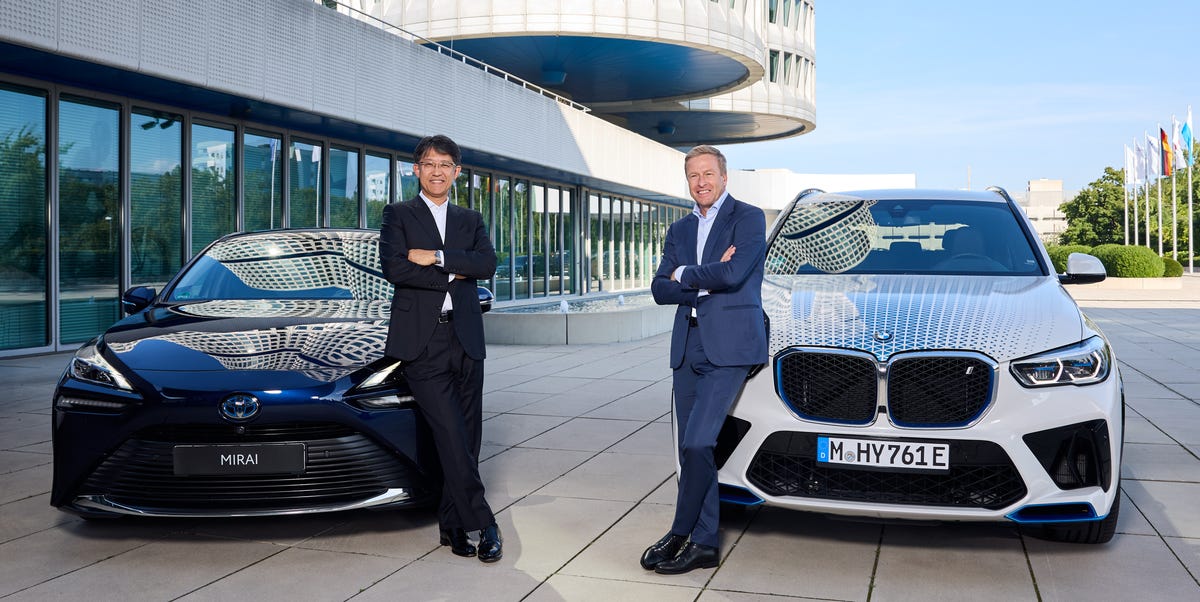
BMW WILL BRING HYDROGEN CARS TO THE MASSES 2028, WITH TOYOTA'S HELP
After years of developing the technology, building prototypes and even going on a world tour with a hydrogen-powered iX5, BMW is officially committing to producing hydrogen fuel-cell vehicles, the first of which are expected to hit the streets come 2028.
The announcement was made in conjunction with Toyota, which will be BMW's partner in the mission. BMW says that it will first collaborate with Toyota on developing powertrain systems for passenger vehicles, the creation of which will pave the way for both commercial and passenger vehicle applications. These new-generation fuel cells will then be applied to individual Toyota and BMW models, with both brands stressing the retention of distinct brand identities and characteristics for these shared-powertrain vehicles.
BMW says its FCEV technology will be first implemented into a vehicle from its existing portfolio, suggesting we may see the introduction of something like a hydrogen-powered 5-Series or X5. (The latter would be a particularly logical choice, given the aforementioned iX5's existence.) Notably, BMW says these FCEV models are not replacing battery-electric technology within its portfolio, as the brand categorizes the two electrified technologies as separate ventures.
"This is a milestone in automotive history: the first-ever series production fuel cell vehicle to be offered by a global premium manufacturer. Powered by hydrogen and driven by the spirit of our cooperation, it will underscore how technological progress is shaping future mobility," said Oliver Zipse, chairman of the board of management at BMW AG.
"In our long history of partnership, we have confirmed that BMW and Toyota share the same passion for cars and belief in ‘technology openness’ and a ‘multi-pathway’ approach to carbon neutrality," said Koji Sato, president and member of the board of management and representative director of the Toyota Motor Corporation. "Based on these shared values, we will deepen our collaboration in efforts such as the joint development of next-generation fuel cell systems and the expansion of infrastructure, aiming for the realization of a hydrogen society."
A primary goal of the collaboration between the two manufacturers is to drive down the cost of hydrogen technology development, both from the standpoint of vehicle drivetrains and the underlying public framework needed to support them. To that end, BMW and Toyota are reportedly pushing the expansion of hydrogen refueling infrastructure, as well as "encouraging sustainable hydrogen supply by creating demand."
Big talk, to be sure, but both brands have already shown tangible results in promoting hydrogen. BMW's South Carolina production plant also benefits from the use of hydrogen, as utility vehicles at the factory are primarily powered by the most common element in the universe. On the other side of the country, Toyota has recently shifted the focus of its California to hydrogen development, calling it the North American Hydrogen Headquarters and pivoting its focus to the communication around and business development of hydrogen technology. And of course, Toyota has also offered its own limited-run hydrogen cars to would-be beta tester consumers, in the form of the Mirai; that car was never sold in large numbers, however, with less than 26,000 copies ever reaching the road over its nine years on sale across two generations.
Looking to purchase a car? Find your match on the MSN Autos Marketplace 2024-09-05T15:20:25Z dg43tfdfdgfd